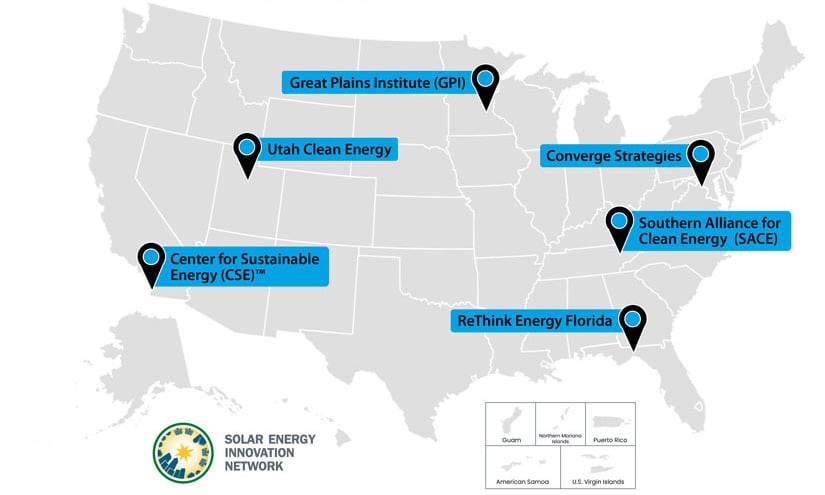Solar Community Assistance for Local Energy
NLR offers targeted assistance to rural and urban areas through Innovation at SCALE (Solar Community Assistance for Local Energy).
Innovation at SCALE applies lessons learned and adapts solutions developed through three rounds of the Solar Energy Innovation Network (SEIN). SEIN is a collaborative research program that supports multistakeholder teams to research, develop, and share solutions to real-world challenges associated with solar photovoltaic (PV) energy adoption. SEIN projects across the U.S. have demonstrated new, effective methods and insights for enabling solar PV to lower energy costs for consumers and businesses.
Innovation at SCALE builds on the success of SEIN projects by bringing these insights to new contexts. Within Innovation at SCALE, NLR and partner organizations are offering targeted technical and analytical assistance to help participants overcome barriers to solar adoption so they can decide whether solar PV is right for them.
Participants in Innovation at SCALE will engage with subject matter experts and SEIN project leaders to identify and implement the insights and lessons from those projects that may be impactful for the participants.
What Assistance Is Provided?
The scope and type of assistance provided will be determined based on the needs of the Innovation at SCALE participant and the application of relevant SEIN outputs (see assistance topic areas below) and does not include direct funding.
Examples of assistance include:
- Consultation with subject matter experts on steps in the solar adoption process
- Key insights from experienced SEIN partners about their project work to lower household and business energy bills
- Analysis and contextualization of site-specific data using NLR's state-of-the-art tools
- Memoranda for applying SEIN project outputs to the participant's context
- Review of project strategy or program design documents
- Other deliverables depending on the goals of the participant.
Assistance is intended to inform decisions or actions related to solar energy analysis undertaken by Innovation at SCALE participants and is provided at no cost to the recipient.
Who Is Eligible?
Innovation at SCALE is open to all U.S.-based stakeholders, including but not limited to local organizations, local government entities, regulatory authorities, and electric utilities. Individual organizations or teams of stakeholders are eligible for technical support.
How To Request Assistance
Assistance is provided at no cost to participants. The number of assistance opportunities is limited, so potential Innovation at SCALE participants are encouraged to submit requests as soon as possible during open application periods.
In requesting assistance, participants must describe how the provided assistance will:
- Align with the participant's goals related to solar adoption
- Relate to the outputs and insights of relevant SEIN topics
- Specifically inform an action, decision, or decision-making process (such as a local government pursuing a solar incentive program for small businesses, or a college campus deciding whether to install a solar-plus-storage microgrid for resilience)
- Be productively applied to move a project, program, strategy, or decision forward.
Requests for Assistance Are Currently Closed
Assistance Topic Areas
Assistance through Innovation at SCALE focuses on the following topic areas. Each topic area relates to multiple outputs and insights from SEIN projects that have been centered around innovations to commercial-scale solar, residential solar, and grid integration.
Prospective Innovation at SCALE participants should scan these topics for common ground with their own goals and barriers related to increasing solar energy availability and adoption. These topics for assistance are not mutually exclusive; an Innovation at SCALE participant may benefit by drawing from multiple topic areas depending on their circumstances.
Although the costs of solar PV have decreased over the years, the financial risk associated with the total cost of the system is still present. Small businesses or households may not have sufficient resources, tax burden, or credit score.
SEIN teams identified the complexity and confusion in navigating financial incentives and opportunities and then researched and tested solutions to reduce these barriers.
Many consumers may either distrust solar or are not aware of the potential economic benefits solar energy offers in their specific circumstances. Stakeholder engagement and outreach strategies can enable households and businesses to choose solar if it is the right decision for them.
Small businesses may face challenges to choosing solar energy. SEIN project teams found that a lack of technical expertise with solar energy and limited access to financing are factors that influence solar adoption decision-making.
Example Solar Energy Innovation Network Projects
Participants in Innovation at SCALE will be using the outputs and insights of completed SEIN projects to advance their own progress toward solar adoption. Summaries of some completed SEIN projects are listed below. Cohorts of past SEIN projects have been centered on commercial-scale and residential-scale solar innovations in urban and rural areas. Based on the needs of the Innovation at SCALE participant, NLR may apply insights, outputs, and lessons learned from all SEIN projects as appropriate, including those supported by past technical assistance efforts.
Innovation at SCALE Partner Providers

Innovation at SCALE partners each bring their deployment expertise, unique experience, and regional focus to provide technical assistance.
Those partners are:
- Center for Sustainable Energy
- Converge Strategies
- Great Plains Institute
- ReThink Energy Florida
- Southern Alliance for Clean Energy
- Utah Clean Energy.
Contact
If you have questions, contact [email protected].
Share
Last Updated Dec. 7, 2025
